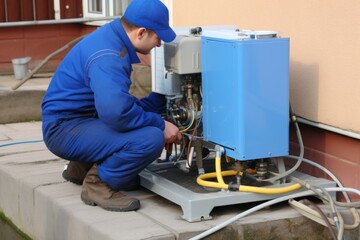Choosing an HVAC Company
Starting a commercial HVAC business requires careful planning and preparation. You must select the right organizational structure and obtain the necessary licenses and certifications to operate your business.
Single-source contractors understand how HVAC equipment interacts with building controls, enabling them to identify opportunities for energy efficiency improvements. This minimizes maintenance issues, extending the lifespan of equipment and optimizing system performance. Contact 24 Hour HVAC Company for professional help.
While anyone can print up a few business cards and claim to be an HVAC contractor, a professional company will have years of experience behind them. They will also have a great track record with previous and current customers. You can check the track record of an HVAC contractor by requesting references from past and present clients, or checking their online reviews.
An established HVAC company will also have a solid financial foundation. They will implement robust bookkeeping practices and regularly review financial statements to evaluate profitability. They will also invest in continuous learning and training for their employees to improve their skills and advance the business.
You should also look for an HVAC company that works with reputable brands. It’s a red flag if they don’t work with well-known manufacturers like Trane and Lennox. You should also make sure they have the proper certifications and licensing, as this shows that they are a qualified and legitimate HVAC contractor.
In addition to licensing and insurance, you should make sure that the HVAC company has a good reputation in your community. Word of mouth is a powerful tool, so it’s important to have an excellent reputation and be known for providing quality service. In order to build a strong reputation, you should invest in marketing and advertising. You can do this by creating a website, using social media, or hosting events to generate buzz.
The right HVAC company will be able to provide you with a written estimate of the cost of the work. This will allow you to compare prices and choose the best one for your needs. A reputable contractor will also offer a warranty on their services and replacement parts.
A home’s HVAC system is an important investment, so it’s essential to keep it properly maintained. A reputable HVAC company can help with this by providing routine maintenance, which can catch small problems before they become costly repairs and improve your system’s efficiency. They can also give you advice on how to improve your energy bill and maintain a healthy indoor environment.
Licensed
The HVAC industry is highly regulated and requires licenses to work in it. The licensing process usually involves fulfilling educational requirements and gaining relevant experience, as well as passing an exam. Licensed professionals are also required to undergo periodic continuing education activities to stay abreast of new developments in the field. This ensures that the technician is competent and adheres to all applicable standards.
As a result, it is important to determine the specific steps required for licensure in your area of the country. This may vary by state and jurisdiction, but generally includes completing a vocational or technical program in heating, ventilation, air conditioning, and refrigeration, accumulating an apprenticeship or on-the-job training, and passing a certification exam. In addition, the licensing process typically includes submitting a detailed application, supplying proof of age and legal status, paying any fees, and passing an interview or additional assessment.
In addition to meeting the educational and experience requirements, it is important to obtain the necessary financial resources to start a commercial HVAC business. This will require extensive research into the market, including competitor analyses and industry trends. It is also essential to create a business plan that outlines your goals, strategies, target clientele, and financial projections. You will need to determine the structure of your company and whether it should be a sole proprietorship, partnership, or corporation.
Once you have obtained the proper licenses and insurance, it is time to begin building your HVAC company. Begin by creating a team of dedicated and experienced technicians, then research potential customers. Identify the types of clients you want to serve, such as office buildings or retail establishments, and develop a marketing strategy that will appeal to these consumers.
Ultimately, your goal should be to build a business that is both successful and sustainable. To do this, you will need to hire the right people, develop a strong business plan, and secure adequate financing. Achieving these objectives will help your company to succeed in the long run, and ensure that your customers are satisfied.
While starting a business in the commercial HVAC industry can be challenging, the rewards are many. With the proper planning and dedication, you can build a successful business that will provide quality service to your clients.
Insurance
Considering the high risk involved in the industry, it is crucial for HVAC contractors to have adequate insurance coverage. This coverage can mitigate risks and protect the business from costly lawsuits. In addition, it can also help to build trust with clients. The type of coverage a contractor needs will depend on their unique circumstances and the risk factors associated with their work. It is also important to evaluate the policy regularly, as changes in risk levels or market conditions may necessitate adjustments in the coverage.
General liability insurance is a necessary component of any HVAC contractor’s portfolio. This coverage protects the business from lawsuits resulting from third-party property damage or bodily injury. It can also cover costs for legal fees and damages incurred due to the negligence of employees or subcontractors.
Another important part of the HVAC contractors’ insurance portfolio is commercial auto insurance, which covers damages caused by accidents involving company vehicles. This is important because HVAC professionals often use their vehicles to transport equipment and workers to job sites. Without this coverage, a single accident can cost the business substantial financial losses.
Additionally, HVAC technicians need to have property insurance to protect their tools and other assets against loss or theft. This type of coverage provides replacement costs or repairs for damaged equipment, which can prevent significant loss of productivity. Finally, HVAC business owners need to consider professional liability insurance, which offers protection against claims for errors and omissions made by the company.
Choosing the right HVAC contractors insurance can be a complicated process, but it is essential for any business. The type of coverage you need will depend on several factors, including your business size, location, and revenue. A broker can help you determine the best options for your needs.
The cost of HVAC contractors insurance can vary depending on a number of factors, including the type and extent of coverage, your business size, and your claims history. In general, more frequent claims result in higher premiums because the insurer views your business as a higher risk. However, a clean claims record can lead to lower premiums and can even qualify you for discounts on your coverage.
Warranties
When choosing an HVAC company, be sure to consider warranties and guarantees. These can help you avoid unexpected costs and give you peace of mind. HVAC systems are expensive investments that require regular maintenance to keep them running at peak performance. A warranty can cover the cost of repairs and replacements, reducing your out-of-pocket expenses.
The most common type of HVAC manufacturer warranty covers part replacements rather than labor. This means that if a particular component breaks down, your technician can send it back to the manufacturer for repair or replacement. Many manufacturers also offer extended parts warranties, which can provide coverage for up to a decade. It is important to note that these warranties only apply if your system was installed properly and maintained regularly. It is also important to be aware of the factors that can void a warranty, including physical damage to equipment and using your system in ways it wasn’t intended to be used.
Another option is an HVAC labor warranty, which provides coverage for the cost of labor for repairs and system installation. This type of warranty is typically offered by the HVAC contractor that installs your system. A good HVAC contractor will include this in their quote for you, so be sure to ask about it. Many manufacturers also require you to register your warranty within a specified period after installation. Failure to do so may result in reduced coverage or even a void of the warranty altogether.
A reputable HVAC contractor will provide a comprehensive labor warranty, which is designed to cover the cost of labor for both repair and replacements. Some manufacturers may also offer an additional parts and labor warranty, providing extensive protection from unexpected repair expenses. Be sure to carefully review each individual warranty term, including the duration of coverage and any limitations or exclusions.
A good HVAC company will have a written warranty policy that clearly outlines what is covered and what is not. They should also provide you with a copy of the warranty in writing, which you can keep for future reference. A warranty is like insurance – you hope to never have to use it, but it’s there in case something goes wrong with your HVAC system.

